八上Unit 1-Unit 5 期中语法课件(共20张PPT)
文档属性
| 名称 | 八上Unit 1-Unit 5 期中语法课件(共20张PPT) | 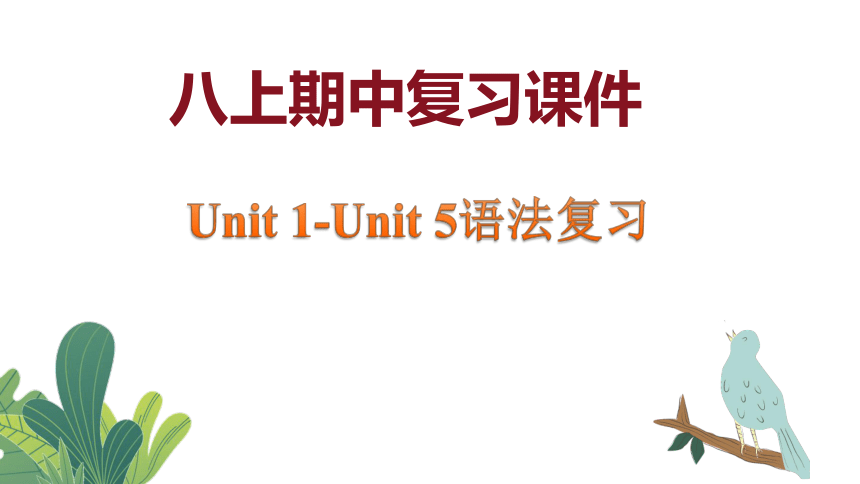 | |
| 格式 | pptx | ||
| 文件大小 | 1.2MB | ||
| 资源类型 | 教案 | ||
| 版本资源 | 人教新目标(Go for it)版 | ||
| 科目 | 英语 | ||
| 更新时间 | 2024-10-10 18:19:18 | ||
图片预览

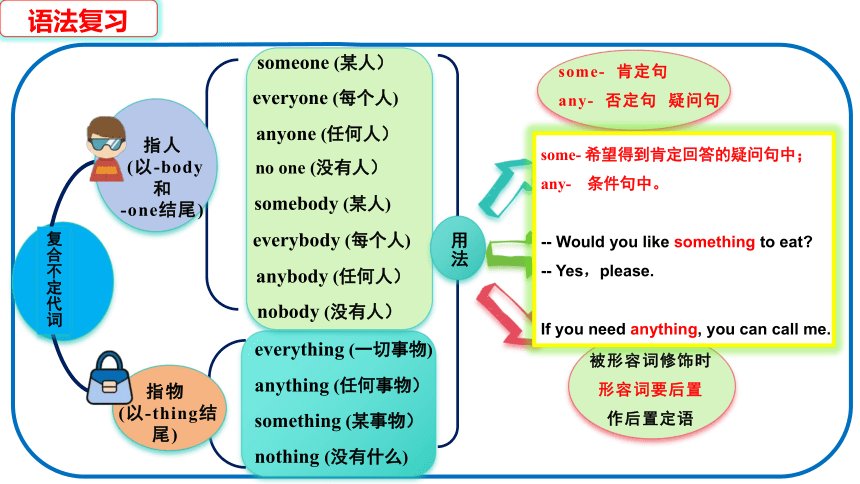
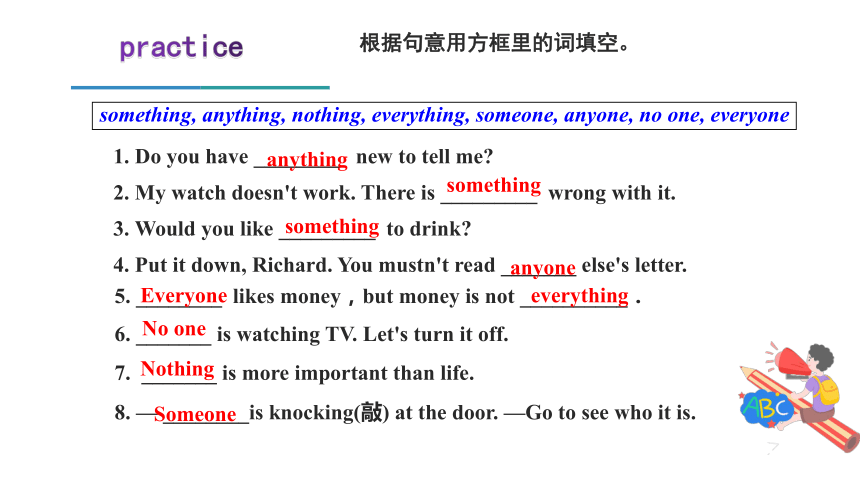
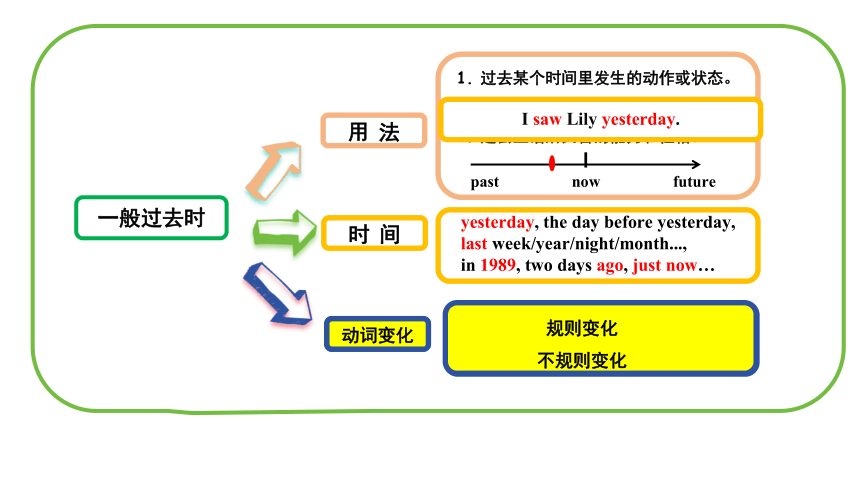
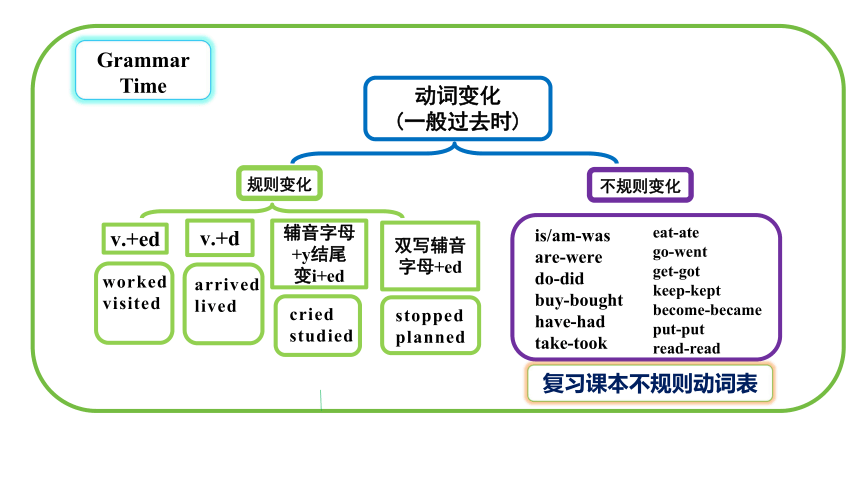
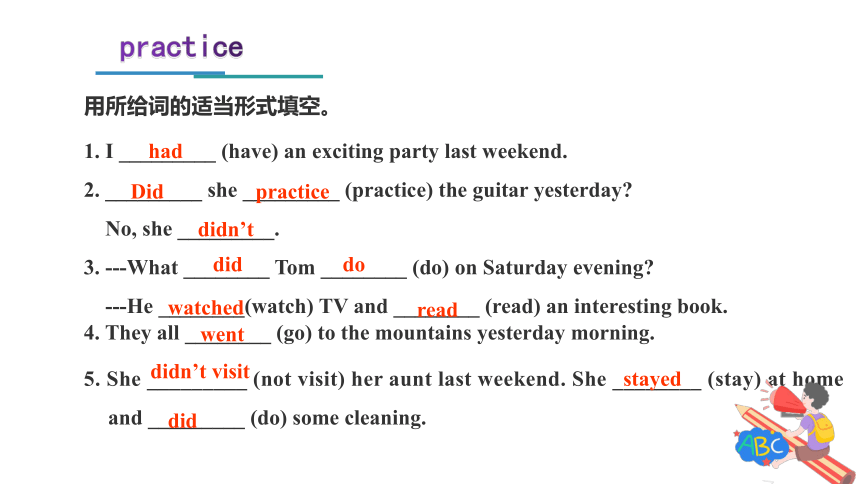
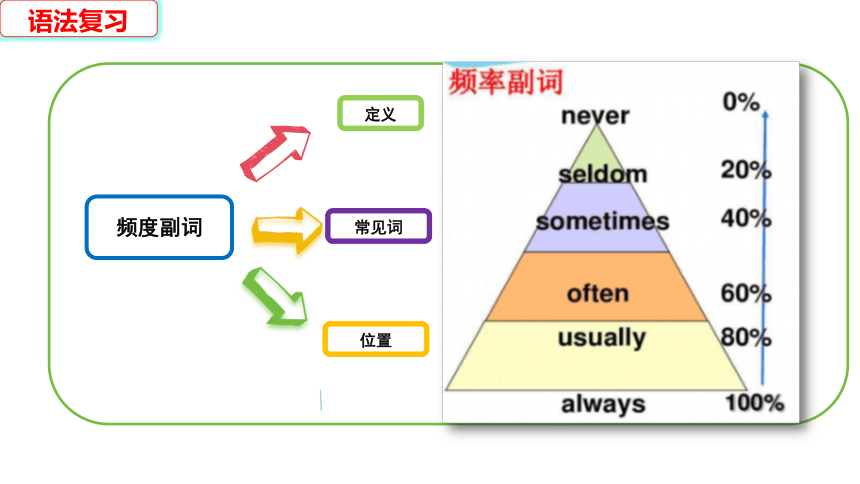
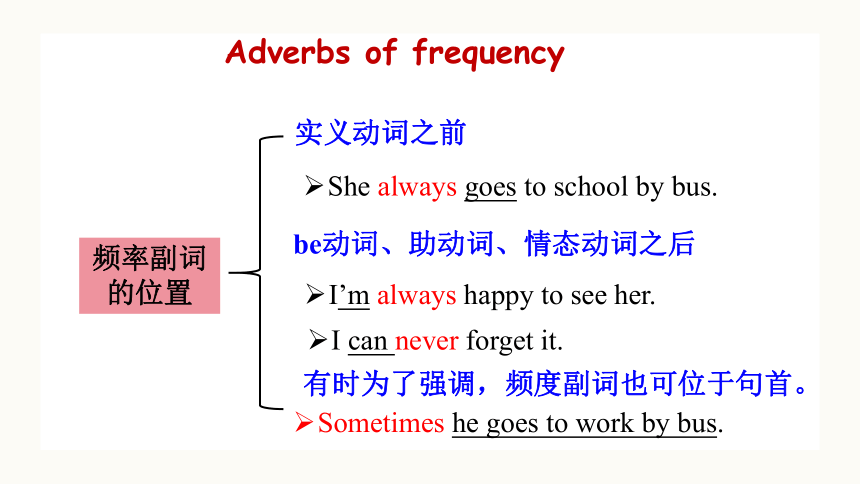
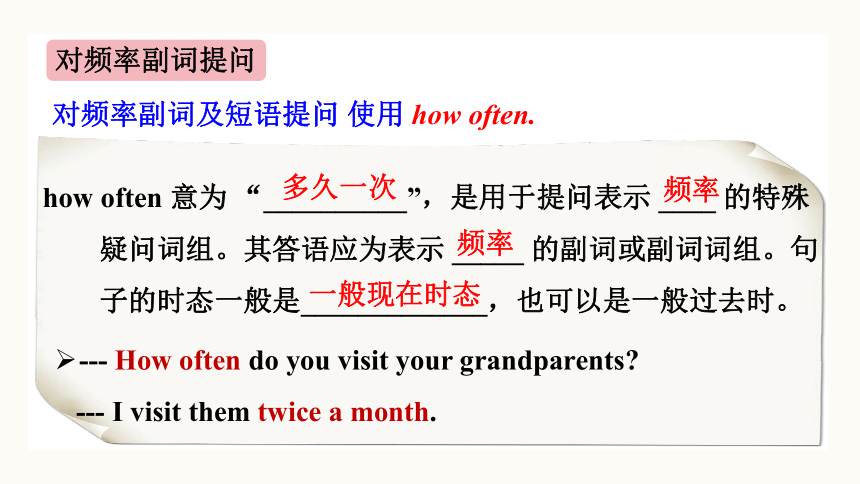
文档简介
(共20张PPT)
八上期中复习课件
Unit 1-Unit 5语法复习
复合不定代词
指人
(以-body和
-one结尾)
everybody (每个人)
everyone (每个人)
anyone (任何人)
everything (一切事物)
anything (任何事物)
something (某事物)
nothing (没有什么)
somebody (某人)
anybody (任何人)
用法
some- 肯定句
any- 否定句 疑问句
作主语时
谓语动词 单数形式
被形容词修饰时
形容词要后置
作后置定语
no one (没有人)
nobody (没有人)
语法复习
指物
(以-thing结尾)
some- 希望得到肯定回答的疑问句中;
any- 条件句中。
-- Would you like something to eat
-- Yes,please.
If you need anything, you can call me.
someone (某人)
1. Do you have ________ new to tell me
2. My watch doesn't work. There is _________ wrong with it.
3. Would you like _________ to drink
4. Put it down, Richard. You mustn't read _______ else's letter.
something, anything, nothing, everything, someone, anyone, no one, everyone
anything
something
something
anyone
practice
根据句意用方框里的词填空。
5. ________ likes money,but money is not __________.
6. _______ is watching TV. Let's turn it off.
7. _______ is more important than life.
8. — ________is knocking(敲) at the door. —Go to see who it is.
Everyone
everything
No one
Nothing
Someone
一般过去时
用 法
时 间
动词变化
1. 过去某个时间里发生的动作或状态。
2. 过去习惯性、经常性的动作、行为。
3. 过去主语所具备的能力和性格。
past now future
yesterday, the day before yesterday, last week/year/night/month...,
in 1989, two days ago, just now…
规则变化
不规则变化
动词变化
规则变化
不规则变化
I saw Lily yesterday.
动词变化
(一般过去时)
规则变化
v.+ed
v.+d
辅音字母
+y结尾
变i+ed
双写辅音
字母+ed
worked
visited
arrived
lived
cried
studied
stopped
planned
不规则变化
is/am-was
are-were
do-did
buy-bought
have-had
take-took
eat-ate
go-went
get-got
keep-kept
become-became
put-put
read-read
Grammar
Time
复习课本不规则动词表
用所给词的适当形式填空。
1. I _________ (have) an exciting party last weekend.
2. _________ she _________ (practice) the guitar yesterday
No, she _________.
3. ---What ________ Tom ________ (do) on Saturday evening
---He ________(watch) TV and ________ (read) an interesting book.
had
Did
practice
didn’t
did
do
watched
read
4. They all ________ (go) to the mountains yesterday morning.
5. She _________ (not visit) her aunt last weekend. She ________ (stay) at home and _________ (do) some cleaning.
went
didn’t visit
did
stayed
practice
never, seldom,
sometimes,
frequently, often,
usually, always …
频度副词
定义
常见词
实义动词 之前,
动词be、助动词、
情态动词等 之后
sometimes 也常置于句首
表示动作发生次数的副词
位置
语法复习
I’m always happy to see her.
实义动词之前
频率副词的位置
be动词、助动词、情态动词之后
有时为了强调,频度副词也可位于句首。
She always goes to school by bus.
Sometimes he goes to work by bus.
I can never forget it.
Adverbs of frequency
对频率副词提问
how often 意为 “__________”,是用于提问表示 ____ 的特殊疑问词组。其答语应为表示 _____ 的副词或副词词组。句子的时态一般是_____________,也可以是一般过去时。
多久一次
对频率副词及短语提问 使用 how often.
频率
频率
一般现在时态
--- How often do you visit your grandparents
--- I visit them twice a month.
funny
heavy
short
thin
hot
funnier/funniest
heavier/heavier
shorter/shortest
thinner/thinnest
hotter/hottest
一般在词尾加er/est。
以“辅音字母+y”结尾的双音节词,先把“y”改为“i”,再加er/est。
重读闭音节词词尾只有一个辅音字母时,先双写该辅音字母,再加er /est。
nice
late
nicer/nicest
later/latest
以字母e结尾的词, 在词尾加r/st。
比较级和最高级的规则变化--单音节词和部分双音节词:
语法复习
outgoing
important
loudly
clearly
quietly
more/most outgoing
more/most important
more/most loudly
more/most clearly
more/mostquietly
在词前加more
规则变化--多音节词和部分双音节词:
不规则变化:
good / well better/best
bad / badly worse/worst
many / much more/most
little less/least
far farther/further farthest/furthest
练练不忘 请写出下列单词的比较集和最高级
tall
short
long
strong
fast
hard
smart...
taller/est
shorter/est
longer/est
stronger/est
faster/est
harder/est
smarter/est...
friendly
funny
early
easy
lazy
...
friendlier/est
funnier/est
earlier/est
easier/est
lazier/est
...
outgoing
hard-working
serious
interesting
comfortable
...
more/ most outgoing
more/ most hard-working
more/ most serious
more/ most interesting
more/ most comfortable
...
fine
late
cute
...
finer/st
later/st
cuter/st
...
fat
thin
big
hot
...
fatter/est
thinner/est
bigger/est
hotter/est
...
good/well
bad/badly
many/much
little
far
形容词和副词的比较级和最高级的变化规则:+er/est; 去e+ er/est; 双写尾字母+ er/est; 不规则变化
friendly
funny
early
easy
lazy
...
better best
worse worst
more most
less least
farther farthest/ further furthest
写出下列单词的比较级和最高级
Exercises
clever __________ cheaply __________ large __________
nice __________ well __________ busy __________
thin __________ fat __________ little __________
beautiful __________ cute __________ heavy __________
far __________ bad __________ relaxing__________
cleverest
most cheaply
largest
nicest
best
busiest
fattest
least
heaviest
cutest
worst
thinnest
most beautiful
farthest/furthest
most relaxing
形容词和副词的
比较级—用法
比较级+than
“less+原级(多音节词或部分双音节词)+than”表示“前者不及后者……”
“比较级+and+比较级”或“more and more+形容词/副词原级”,表示“越来越……”,其后均不可接than。
“The+比较级,the+比较级”意为“越……,越……:。
“Which/Who…+比较级,A or B ” 表示“A和B,哪一个/谁更……?”
“the+比较级+of the two…”结构,表示“两者中比较……的一个”。
“A…+倍数+比较级+than+B”表示“A是B的多少倍”。
“比较级+than any other+名词单数”=“比较级+than+the other+名词复数”
形容词和副词的
最高级—用法
the+最高级+范围in/of
形容词词性物主代词/指示代词/等限定词+形容词的最高级+名词
one of the+形容词的最高级+名词复数 “最。。。之一”
the+序数词+最高级。
“Which/Who…+比较级,A,B or C ” 表示“A、B和C,哪一个/谁最……?”
“比较级+than any other+名词单数”=“比较级+than+the other+名词复数与最高级互换”
根据句意用所给词的适当形式填空。
1. Holly is _____________(outgoing) than her sister Molly.
2. —Who is ______ (good) at cooking, your mother or your father
—My mother. I think the food she cooks is______________(delicious).
3. My best friend is _______ (thin) than me.
4. Tina is _____________ (popular) than Betty in their school.
5. My sister is four years ______ (old) than me.
more outgoing
better
more delicious
thinner
more popular
older
practice
动词+不定式
动词+疑问词+不定式
动词不定式作宾语
要求、选择和同意
期望、决定和学习
宁可、假装和计划
希望、想要和愿意
ask, choose, agree
expect, decide, learn
prefer, pretend, plan
wish, hope, want, would like
常见动词有
常见的动词有
decide, know, ask, show, teach, guess, find out 等
如:We must know what to do next. 我们知道下一步该做什么。
He hasn’t decided where to go for the summer vacation.
他还没决定暑假去哪儿。
你还记得本单元的语法点吗?
人教版八年级英语上册Unit5复习课件(共26张PPT)
人教版八年级英语上册Unit5复习课件(共26张PPT)
语法复习
既可接动词不定式又可接动名词作宾语的动词
remember
forget
记住曾做过
某事
记住曾做过
某事
doing
to do
忘记曾做过某事
忘记要做某事
try
试着做某事
设法,尽力做某事
mean
意味着做某事
打算做某事
stop
停止正在做的事情
停下来去做另一件事
人教版八年级英语上册Unit5复习课件(共26张PPT)
人教版八年级英语上册Unit5复习课件(共26张PPT)
用括号内所给单词的适当形式填空。
1. Mother's Day is coming. What do you want ________(buy) for your mom
2. Her daughter is learning _________ (play) the piano.
3. Alice seems __________ (like) the gift very much.
4. I hope___________(visit) Sanya this winter.
5.I expect you __________(come) here tomorrow on time.
to buy
to play
to like
to visit
to come
Exercise
1.Please stop_______and go out for a walk. Remember _____ warm clothes.
A.to study;wearing B.studying;to wear
C.to study;to wear D.studying;wearing
2.The baby stopped _____ and _____the music.
A. crying; to listen B. to cry; listened to
C. crying; to listen to D. to cry; listen to
3.Lisa often forgets _____ the door, but she remembered _____ it when she left yesterday.
A. closing; close B. to close; close
C. closing; to close D. to close; closing
B
C
D
Exercise
八上期中复习课件
Unit 1-Unit 5语法复习
复合不定代词
指人
(以-body和
-one结尾)
everybody (每个人)
everyone (每个人)
anyone (任何人)
everything (一切事物)
anything (任何事物)
something (某事物)
nothing (没有什么)
somebody (某人)
anybody (任何人)
用法
some- 肯定句
any- 否定句 疑问句
作主语时
谓语动词 单数形式
被形容词修饰时
形容词要后置
作后置定语
no one (没有人)
nobody (没有人)
语法复习
指物
(以-thing结尾)
some- 希望得到肯定回答的疑问句中;
any- 条件句中。
-- Would you like something to eat
-- Yes,please.
If you need anything, you can call me.
someone (某人)
1. Do you have ________ new to tell me
2. My watch doesn't work. There is _________ wrong with it.
3. Would you like _________ to drink
4. Put it down, Richard. You mustn't read _______ else's letter.
something, anything, nothing, everything, someone, anyone, no one, everyone
anything
something
something
anyone
practice
根据句意用方框里的词填空。
5. ________ likes money,but money is not __________.
6. _______ is watching TV. Let's turn it off.
7. _______ is more important than life.
8. — ________is knocking(敲) at the door. —Go to see who it is.
Everyone
everything
No one
Nothing
Someone
一般过去时
用 法
时 间
动词变化
1. 过去某个时间里发生的动作或状态。
2. 过去习惯性、经常性的动作、行为。
3. 过去主语所具备的能力和性格。
past now future
yesterday, the day before yesterday, last week/year/night/month...,
in 1989, two days ago, just now…
规则变化
不规则变化
动词变化
规则变化
不规则变化
I saw Lily yesterday.
动词变化
(一般过去时)
规则变化
v.+ed
v.+d
辅音字母
+y结尾
变i+ed
双写辅音
字母+ed
worked
visited
arrived
lived
cried
studied
stopped
planned
不规则变化
is/am-was
are-were
do-did
buy-bought
have-had
take-took
eat-ate
go-went
get-got
keep-kept
become-became
put-put
read-read
Grammar
Time
复习课本不规则动词表
用所给词的适当形式填空。
1. I _________ (have) an exciting party last weekend.
2. _________ she _________ (practice) the guitar yesterday
No, she _________.
3. ---What ________ Tom ________ (do) on Saturday evening
---He ________(watch) TV and ________ (read) an interesting book.
had
Did
practice
didn’t
did
do
watched
read
4. They all ________ (go) to the mountains yesterday morning.
5. She _________ (not visit) her aunt last weekend. She ________ (stay) at home and _________ (do) some cleaning.
went
didn’t visit
did
stayed
practice
never, seldom,
sometimes,
frequently, often,
usually, always …
频度副词
定义
常见词
实义动词 之前,
动词be、助动词、
情态动词等 之后
sometimes 也常置于句首
表示动作发生次数的副词
位置
语法复习
I’m always happy to see her.
实义动词之前
频率副词的位置
be动词、助动词、情态动词之后
有时为了强调,频度副词也可位于句首。
She always goes to school by bus.
Sometimes he goes to work by bus.
I can never forget it.
Adverbs of frequency
对频率副词提问
how often 意为 “__________”,是用于提问表示 ____ 的特殊疑问词组。其答语应为表示 _____ 的副词或副词词组。句子的时态一般是_____________,也可以是一般过去时。
多久一次
对频率副词及短语提问 使用 how often.
频率
频率
一般现在时态
--- How often do you visit your grandparents
--- I visit them twice a month.
funny
heavy
short
thin
hot
funnier/funniest
heavier/heavier
shorter/shortest
thinner/thinnest
hotter/hottest
一般在词尾加er/est。
以“辅音字母+y”结尾的双音节词,先把“y”改为“i”,再加er/est。
重读闭音节词词尾只有一个辅音字母时,先双写该辅音字母,再加er /est。
nice
late
nicer/nicest
later/latest
以字母e结尾的词, 在词尾加r/st。
比较级和最高级的规则变化--单音节词和部分双音节词:
语法复习
outgoing
important
loudly
clearly
quietly
more/most outgoing
more/most important
more/most loudly
more/most clearly
more/mostquietly
在词前加more
规则变化--多音节词和部分双音节词:
不规则变化:
good / well better/best
bad / badly worse/worst
many / much more/most
little less/least
far farther/further farthest/furthest
练练不忘 请写出下列单词的比较集和最高级
tall
short
long
strong
fast
hard
smart...
taller/est
shorter/est
longer/est
stronger/est
faster/est
harder/est
smarter/est...
friendly
funny
early
easy
lazy
...
friendlier/est
funnier/est
earlier/est
easier/est
lazier/est
...
outgoing
hard-working
serious
interesting
comfortable
...
more/ most outgoing
more/ most hard-working
more/ most serious
more/ most interesting
more/ most comfortable
...
fine
late
cute
...
finer/st
later/st
cuter/st
...
fat
thin
big
hot
...
fatter/est
thinner/est
bigger/est
hotter/est
...
good/well
bad/badly
many/much
little
far
形容词和副词的比较级和最高级的变化规则:+er/est; 去e+ er/est; 双写尾字母+ er/est; 不规则变化
friendly
funny
early
easy
lazy
...
better best
worse worst
more most
less least
farther farthest/ further furthest
写出下列单词的比较级和最高级
Exercises
clever __________ cheaply __________ large __________
nice __________ well __________ busy __________
thin __________ fat __________ little __________
beautiful __________ cute __________ heavy __________
far __________ bad __________ relaxing__________
cleverest
most cheaply
largest
nicest
best
busiest
fattest
least
heaviest
cutest
worst
thinnest
most beautiful
farthest/furthest
most relaxing
形容词和副词的
比较级—用法
比较级+than
“less+原级(多音节词或部分双音节词)+than”表示“前者不及后者……”
“比较级+and+比较级”或“more and more+形容词/副词原级”,表示“越来越……”,其后均不可接than。
“The+比较级,the+比较级”意为“越……,越……:。
“Which/Who…+比较级,A or B ” 表示“A和B,哪一个/谁更……?”
“the+比较级+of the two…”结构,表示“两者中比较……的一个”。
“A…+倍数+比较级+than+B”表示“A是B的多少倍”。
“比较级+than any other+名词单数”=“比较级+than+the other+名词复数”
形容词和副词的
最高级—用法
the+最高级+范围in/of
形容词词性物主代词/指示代词/等限定词+形容词的最高级+名词
one of the+形容词的最高级+名词复数 “最。。。之一”
the+序数词+最高级。
“Which/Who…+比较级,A,B or C ” 表示“A、B和C,哪一个/谁最……?”
“比较级+than any other+名词单数”=“比较级+than+the other+名词复数与最高级互换”
根据句意用所给词的适当形式填空。
1. Holly is _____________(outgoing) than her sister Molly.
2. —Who is ______ (good) at cooking, your mother or your father
—My mother. I think the food she cooks is______________(delicious).
3. My best friend is _______ (thin) than me.
4. Tina is _____________ (popular) than Betty in their school.
5. My sister is four years ______ (old) than me.
more outgoing
better
more delicious
thinner
more popular
older
practice
动词+不定式
动词+疑问词+不定式
动词不定式作宾语
要求、选择和同意
期望、决定和学习
宁可、假装和计划
希望、想要和愿意
ask, choose, agree
expect, decide, learn
prefer, pretend, plan
wish, hope, want, would like
常见动词有
常见的动词有
decide, know, ask, show, teach, guess, find out 等
如:We must know what to do next. 我们知道下一步该做什么。
He hasn’t decided where to go for the summer vacation.
他还没决定暑假去哪儿。
你还记得本单元的语法点吗?
人教版八年级英语上册Unit5复习课件(共26张PPT)
人教版八年级英语上册Unit5复习课件(共26张PPT)
语法复习
既可接动词不定式又可接动名词作宾语的动词
remember
forget
记住曾做过
某事
记住曾做过
某事
doing
to do
忘记曾做过某事
忘记要做某事
try
试着做某事
设法,尽力做某事
mean
意味着做某事
打算做某事
stop
停止正在做的事情
停下来去做另一件事
人教版八年级英语上册Unit5复习课件(共26张PPT)
人教版八年级英语上册Unit5复习课件(共26张PPT)
用括号内所给单词的适当形式填空。
1. Mother's Day is coming. What do you want ________(buy) for your mom
2. Her daughter is learning _________ (play) the piano.
3. Alice seems __________ (like) the gift very much.
4. I hope___________(visit) Sanya this winter.
5.I expect you __________(come) here tomorrow on time.
to buy
to play
to like
to visit
to come
Exercise
1.Please stop_______and go out for a walk. Remember _____ warm clothes.
A.to study;wearing B.studying;to wear
C.to study;to wear D.studying;wearing
2.The baby stopped _____ and _____the music.
A. crying; to listen B. to cry; listened to
C. crying; to listen to D. to cry; listen to
3.Lisa often forgets _____ the door, but she remembered _____ it when she left yesterday.
A. closing; close B. to close; close
C. closing; to close D. to close; closing
B
C
D
Exercise
同课章节目录
